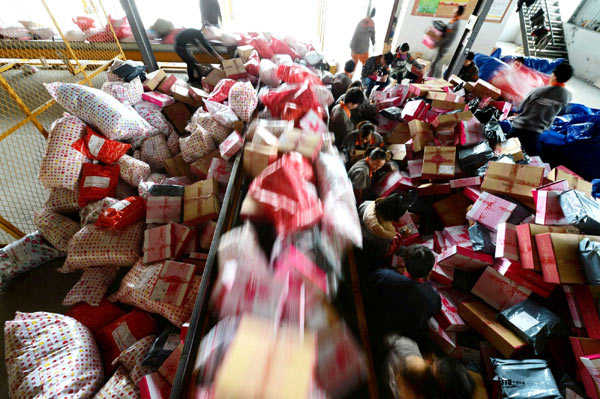|
Goods for delivery pile up at a distribution center for courier company Shentong Express in Yangzhou, Jiangsu province, on Monday. [China Daily] |
Chinese shoppers spent billions online yesterday as they took advantage of discounts offered on Single’s Day, a festival seized on by online retailers to increase sales.
November 11 was proclaimed Single’s Day because of the number of ones in the date and first appeared on student campuses, with young single people celebrating the day by eating together, sending gifts or going shopping.
Now a massive shopping extravaganza, it took just 13 hours for sales on just two online sites, Taobao and Tmall, to fly past last year’s overall total of 19.1 billion yuan (US$3.1 billion).
Yesterday’s final figure reached an astonishing 35.02 billion yuan as hundreds of thousands of consumers rushed to buy clothes, furniture, home decoration items at discount prices.
A common greeting among friends and colleagues yesterday was “Bought anything today?” as they exchanged tales of bargains or disappointing news of popular items sold out minutes after the spree began at midnight.
In under nine hours, turnover at the Alibaba Group’s Tmall and Taobao sites had exceeded that of last year’s Cyber Monday, a similar event in the United States.
Cyber Monday, the Monday after Thanksgiving in the United States, recorded US$1.4 billion in sales on November 26 last year.
There were a few glitches at Alibaba’s payment unit in the first 10 minutes of yesterday’s shopping spree with some orders declined and customers having to refresh webpages and repeat the payment process to secure purchases.
Round trip to Sydney
Jenny Dong, a Shanghai office worker, was one of the lucky shoppers as she grabbed a round-trip ticket to Sydney for 4,700 yuan, a 30 percent discount on the normal price.
“The price was so attractive as I’ve been longing for a vacation to Australia and I was so excited to successfully put the order the very second after midnight,” she said.
Sherry Chen, a postgraduate student, was among the many consumers delighted to pick up a bargain online. Chen said she got a pair of boots on Tmall at 40 percent of the department store price.
“I don’t care if it’s November 11 or December 12. As long as they have sales promotions, I’m more than happy to participate,” she said.
The line between online and offline retailers is gradually blurring, said Jason Yu, general manager of market research firm Kantar Worldpanel China.
“The offline retail presence of apparel vendors such as Uniqlo is an indispensable part of the massive amount of sales of its online unit, and retailers need to create a multi-channel shopping experience for consumers,” Yu said.
A Kantar Worldpanel study showed that up to a third of consumers are spending their money online this year instead of in traditional stores, Yu said.
The study found that of 1.1 trillion yuan in sales of fast moving consumer goods in the 52 weeks to September 6 this year, expenditure through e-commerce channels jumped 45 percent from a year earlier, much faster than the 9 percent annual growth in hypermarkets and supermarket chains.
In an online survey by CTR Market Research Co of 7,117 web users last week, 73 percent said they would buy from online vendors this year and spend an average of 1,078 yuan, 68 yuan more than last year.
In the past 12 months, online shoppers spent an average of 4,185 yuan, according to media investment firm GroupM.
The survey of 19,400 respondents in 279 cities across China reported a sharp rise in online expenditure among third and fourth tier cities with residents spending 31.8 percent more than the previous year, or 3,768 yuan each. The average amount spent by first and second tier city residents was 4,378 yuan.
![]()
